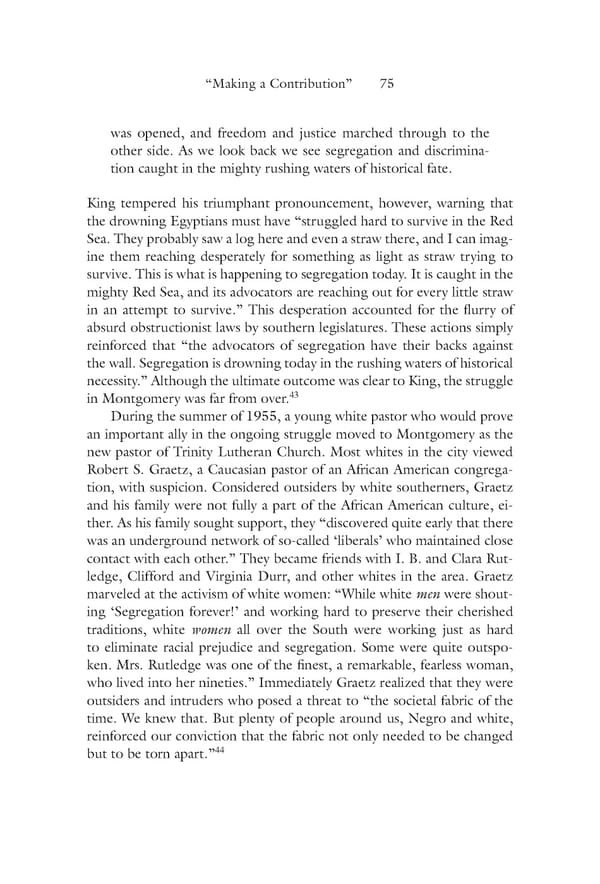“Making a Contribution” 75 was opened, and freedom and justice marched through to the other side. As we look back we see segregation and discrimina- tion caught in the mighty rushing waters of historical fate. King tempered his triumphant pronouncement, however, warning that the drowning Egyptians must have “struggled hard to survive in the Red Sea. They probably saw a log here and even a straw there, and I can imag- ine them reaching desperately for something as light as straw trying to survive. This is what is happening to segregation today. It is caught in the mighty Red Sea, and its advocators are reaching out for every little straw in an attempt to survive.” This desperation accounted for the flurry of absurd obstructionist laws by southern legislatures. These actions simply reinforced that “the advocators of segregation have their backs against the wall. Segregation is drowning today in the rushing waters of historical necessity.” Although the ultimate outcome was clear to King, the struggle 43 in Montgomery was far from over. During the summer of 1955, a young white pastor who would prove an important ally in the ongoing struggle moved to Montgomery as the new pastor of Trinity Lutheran Church. Most whites in the city viewed Robert S. Graetz, a Caucasian pastor of an African American congrega- tion, with suspicion. Considered outsiders by white southerners, Graetz and his family were not fully a part of the African American culture, ei- ther. As his family sought support, they “discovered quite early that there was an underground network of so-called ‘liberals’ who maintained close contact with each other.” They became friends with I. B. and Clara Rut- ledge, Clifford and Virginia Durr, and other whites in the area. Graetz marveled at the activism of white women: “While white men were shout- ing ‘Segregation forever!’ and working hard to preserve their cherished traditions, white women all over the South were working just as hard to eliminate racial prejudice and segregation. Some were quite outspo- ken. Mrs. Rutledge was one of the finest, a remarkable, fearless woman, who lived into her nineties.” Immediately Graetz realized that they were outsiders and intruders who posed a threat to “the societal fabric of the time. We knew that. But plenty of people around us, Negro and white, reinforced our conviction that the fabric not only needed to be changed 44 but to be torn apart.”
 Becoming King: Martin Luther King Jr. Page 95 Page 97
Becoming King: Martin Luther King Jr. Page 95 Page 97